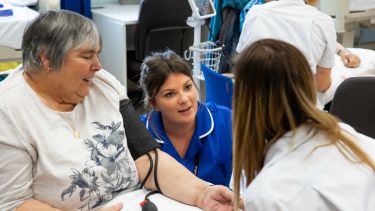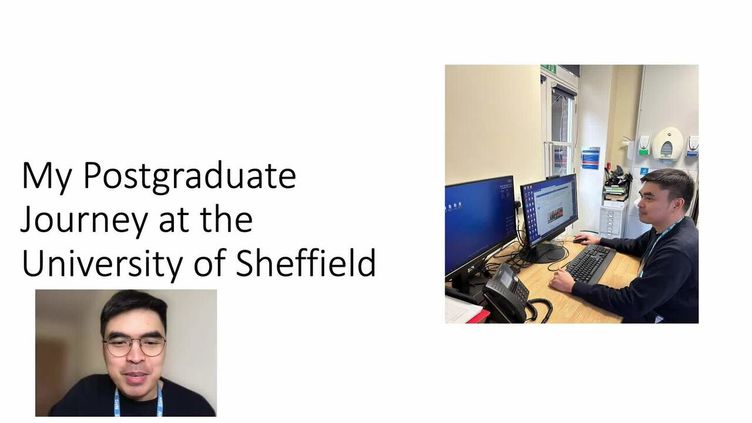Health and Clinical Research Delivery MSc PG Certificate PG Diploma
School of Medicine and Population Health,
Faculty of Health
-
Start date
September 2025 -
Duration
1 year 2 years 3 years -
Attendance
Part-time Distance learning
Explore this course:
Applications for 2025 entry closed at 5pm on Friday 5 September. Applications for 2026 entry open on Monday 15 September.

Course description
This part-time, fully online programme is designed for practitioners such as doctors, nurses, midwives, pharmacists, healthcare scientists, and allied health professionals who want to excel in clinical research delivery. Whether you are new to research or already involved, this course prepares you with essential skills to improve future healthcare for your patients.
Our curriculum focuses on the practical aspects of delivering clinical research. You'll explore ways to enhance participant recruitment and consider the challenges and impacts of conducting research. The module on research practice experience will let you apply what you learn by participating directly and reflecting on real-world research delivery activities. By the end of the course, you'll have the skills and confidence to lead health-related or clinical research that improves people’s health and well-being and health and social care services.
Flexible study
Our program offers maximum flexibility to fit your work and personal commitments. You'll study part-time online, allowing you to progress at your own pace and integrate learning into your professional practice from any location.
You can tailor your study duration to your goals: complete a PG Certificate in one year, a PG Diploma in two years, or a full master's in three years. We offer flexibility to adjust your study timeline as needed, with support throughout.
To succeed, you should
- dedicate about 20 hours per week to coursework
- spend approximately 3 hours per week on practical and research activities
- identify a work-based supervisor for the Research Practice module
- secure organisational support and approval from your line manager
- if employed outside England, work for an organisation involved in health, care or clinical research with access to local research delivery training
Applying
To ensure you have the support you need to succeed, you'll need to upload a signed letter of support from your employer, who has agreed to support you during your studies.
Applying for Recognition of Prior Learning (RPL)
You can apply to use previous study or experiential learning to count towards your health and clinical research delivery qualification.
For more information on RPL read the University of Sheffield's Recognition of Prior Learning policy.
To make an application you must complete the RPL application form and email it to population-health-hcrd@sheffield.ac.uk
If you are applying for RPL based on experiential learning, you should refer to the HCRD RPL Guidance carefully to ensure that you include all of the relevant information.
You will also need to submit a postgraduate online application form to be considered for entry. Approval of your RPL application does not guarantee you a place on the course.
Use the link below to view the Masters in Clinical Research (MClinRes) course:
Do you have a question? Talk to us
Book a 15-minute online meeting with our school postgraduate taught courses director to find out more information and ask further questions.
Accreditation
All our HCRD qualifications are accredited by the National Institute for Health and Care Research (NIHR) and the Academy of Medical Royal Colleges (AoMRC).
This programme has been developed in line with the new NIHR-AoMRC Clinician Researcher Credentials Framework. This framework was designed by both the NIHR and the AoMRC to bridge the research skills gap within the NHS and other healthcare services. We work with partner organisations from the healthcare sector to develop the course and tailor it to your needs.
Modules
Students with a PG Certificate (60 credits) from a Clinician Researcher Credentials accredited University - either King's College London, the University of Exeter or Newcastle University - can transfer their 60 credits to the University of Sheffield to continue and 'top up' their qualification on our PG Diploma or MSc through Recognition of Previous Learning.
Students completing the PG Certificate at the University of Sheffield will take the following core modules:
- Introduction to Research Methods Online
-
This module, which is delivered via online learning, provides students with an introduction to quantitative and qualitative research methods and to the types of skills necessary for the planning, data gathering and dissemination stages of health-related research. Topics covered include: -Research Design; -Methods of Data Collection; -Approaches to Analysing Data and Writing a Research Proposal. The course provides a foundation for further learning in specific research methods. It is primarily designed for new students beginning Masters courses in the Division of Population Health and there is an emphasis on research techniques used in public health and health services research (HSR).
15 credits - Research Practice Experience 1
-
The module aims to enable students to develop and utilise their skills and knowledge of the research process and networked research to learn experientially through direct involvement in one or several research studies. At the start and end of the module students will undertake a Training Needs Analysis (TNA). For this module, students will work alongside an experienced clinical/ practice based supervisor who is currently leading or involved in a research study in a field of practice of interest to the student. In addition they will be allocated an academic supervisor who will contribute to the supervision process. Students will meet with their supervisory team regularly throughout the module to review, develop and assess learning and development. Students will receive additional formative feedback within regular tutorial meetings with the module lead, peer review activities and group discussions. The module will be delivered using a mix of online videos, audio podcasts, written materials, and online discussion, which students can complete in their own time during the module. It will be undertaken over the spring semester and will be delivered via The University of Sheffield's online teaching platform.
15 credits - Doing Health and Clinical Research Well
-
This module will cover many of the practical and regulatory issues associated with carrying out clinical or health related research within a variety of national and international settings, including the NHS.
15 credits
This will include consideration of research planning, project management, research governance, patient recruitment and retention, ethical and legal frameworks for research, good clinical practice, patient and public involvement, cultural competence, delivery of the project and dissemination and impact.
The module will be delivered using a mix of synchronous online tutorials (recorded for asynchronous availability), online videos, online written materials and associated tasks, and online ('text chat') discussion, which students can complete in their own time during the module. - Leading and Managing Health Services Online
-
This module integrates the principles of managing health care services and leading on rapid changes and advances in regional, national and international contexts. Principles of health management will be demonstrated through case-based teaching, in order to enable students to understand how to solve common management problems. Cases will be used to illustrate the complexity of the operating environment for health systems and health services. Students will be supported in developing critical thinking about the relative effectiveness of different approaches to management by analysing their own health care services within a broader cultural, political and policy context.
15 credits
PG Diploma students will complete the same modules as PG Certificate students, as well as additional modules.
Core modules:
- Research Practice Experience 2
-
The module aims to enable students to further develop and utilise their skills and knowledge of the research process to learn experientially through direct involvement in one or several research studies. At the start and end of the module students will undertake a Training Needs Analysis (TNA). During the module students will develop a comprehensive e-portfolio of evidence to demonstrate proficiency in a range of practice based core research leadership skills and knowledge. For this module, students will work alongside an experienced clinical/ practice based supervisor who is currently leading or involved in a research study in a field of practice of interest to the student. In addition they will be allocated an academic supervisor who will contribute to the supervision process. Students will meet with their supervisory team regularly throughout the module to review, develop and assess learning and development. Students will receive additional formative feedback within regular tutorial meetings with the module lead, peer review activities and group discussions. The module will be delivered using a mix of online videos, audio podcasts, written materials, and online discussion, which students can complete in their own time during the module. It will be undertaken over two semesters and will be delivered via The University of Sheffield's online teaching platform.
30 credits - Inclusive Research Practice
-
This module aims to equip students to identify barriers to the inclusion of diverse and underserved groups in research, and to plan appropriate actions to promote the inclusion of these groups. The module will be delivered online using a variety of methods including online lectures, presentations by researchers and members of diverse and underserved groups, formative learning activities and self-study. The topics covered will include a range of approaches to improving inclusion in research from patient and public involvement and engagement (PPIE) to co-production of research. We will consider how these different approaches can be used in a range of research designs to promote inclusivity throughout the research cycle.
15 credits - Innovative Designs for Research Impact
-
This module will ensure that clinical research practitioners are aware of recent developments in innovative study designs. This will include consideration of project management, patient recruitment and retention, and delivery of the project. We will use real-world case studies from the National Institute for Health Research to discuss innovative designs (e.g. multi-arm, adaptive, stepped-wedge trials and complex, mixed-methods studies) and how these might affect the approach to delivery. The module will be delivered using a mix of synchronous and asynchronous (recorded) online tutorials, online videos, audio podcasts, written materials, and online ('text chat') discussion, which students can complete in their own time during the module.
15 credits
Masters students will complete the same core modules as PG Certificate and PG Diploma students, and will also complete a dissertation project.
- Dissertation
-
This module provides students an opportunity to undertake substantial personal projects (research / literature review). The project topic must be relevant to the scope of the course and should be realistically achievable within the time and resources available.
60 credits
Students are encouraged to work up a concept based on an area of particular interest and/or relevance to themselves. The subject and methodological approach will be agreed between each individual student and their academic supervisor. The completed work will be written up in the form of a dissertation.
The module runs across both semesters and students need to register for the Autumn semester and continue into the Spring semester. There is no option to start in Spring and continue to the following Autumn semester.
This module is an online module. Students will be given the opportunity to engage in at least one live synchronous online session with the module lead at the start of the module. This will be recorded for those students unable to attend due to clinical commitments/time zone differences. In addition dissertation supervisors may offer synchronous online supervision sessions.
The content of our courses is reviewed annually to make sure it's up-to-date and relevant. Individual modules are occasionally updated or withdrawn. This is in response to discoveries through our world-leading research; funding changes; professional accreditation requirements; student or employer feedback; outcomes of reviews; and variations in staff or student numbers. In the event of any change we will inform students and take reasonable steps to minimise disruption.
Open days
An open day gives you the best opportunity to hear first-hand from our current students and staff about our courses.
Duration
- MSc (with no RPL top-up): 3 years
- MSc (via RPL top-up): 2 years
- PGDip (with no RPL top-up): 2 years
- PGDip (via RPL top-up): 1 year
- PGCert: 1 year
Teaching
Extensive support is available for students returning to academia after a break from formal study. You will get help with study techniques, academic writing, time management and other essential skills for success.
All of your teaching will take place online. You will learn through presentations, video and audio content, screencasts, tutorials, group work and independent study. There are optional live webinars that offer more opportunities to interact with your tutors and peers.
Assessment
You will be assessed through written assignments, essays and reports, a practice-based placement e-portfolio and, if you do the MSc programme, a dissertation.
Your career
As a graduate, you'll be equipped to introduce or advance research in your current workplace, serving as a Collaborator, Co-investigator, or Principal Investigator (PI).
Alternatively, you can pursue career opportunities in research-intensive healthcare environments or clinical academic research, such as roles in research nursing, clinical trial coordination, or data analysis. This program also serves as excellent preparation for further academic pursuits, including PhD studies or research fellowships.
Student profiles
Arvin's Postgraduate Journey
Arvin Fernando talks about his experience on the course.
Entry requirements
A 2:1 undergraduate honours degree in a clinical or health care related subject. However, we will consider applicants who do not meet these criteria, but who can provide evidence of relevant work-based experience alongside a lower degree classification or other relevant medical, healthcare or nursing qualifications.
Letter of support
To ensure you have the support you need to succeed, we will ask you to upload a letter of support from your employer. This signed letter needs to be from an individual within your organisation who has agreed to support you during your studies.
The letter must be signed by your ‘supporter’, be on headed paper, state the name and role of your ‘supporter’ and include an acknowledgement that you have discussed the course and the above study requirements with them, including the 20 hours a week study time required to participate.
English language requirements
IELTS 6.5 (with 6 in each component) or University equivalent.
If you have any questions about entry requirements, please contact the school/department.
Fees and funding
Health and Clinical Research Delivery (HCRD) Bursaries
Bursary applications for study in 2025/6 have now closed.
Bursaries are expected to be available to pay the course fees for studying on the HCRD programme in the 2026/27 academic year for all registered health and care professionals (including clinical research practitioners) who meet the eligibility criteria detailed on the NIHR website.
For further information, including guidance on the 2026/7 application process and to sign up for alerts, please visit the NIHR Clinician researcher credentials website.
Eligibility criteria for bursary applications
Applicants must be registered health and care professionals.
Bursary recipients MUST have a course offer from the University of Sheffield HCRD course (or one of the other universities that align to the NIHR Clinician Researcher Credentials Framework).
Applicants must work in the NHS or a publicly funded healthcare setting in England.
Applicants must agree to share the information provided on the bursary application form with the universities delivering courses aligned with the Clinician Researcher Credentials Framework and anonymised details with the bursary selection panel.
Applicants must permit the NIHR to contact them about their experiences of the course and their ongoing career development for up to five years post completion of the course.
Applicants must have the support of their employer's Research and Development department or equivalent to undertake the course.
Applicants must understand the time commitment for the course and have made arrangements to ensure that they will have enough time to complete it. (Full time employees are strongly encouraged to agree to time off work for study time with their employer.)
MSc fee per year
Alumni discount
Save up to £2,500 on your course fees
Are you a Sheffield graduate? You could save up to £2,500 on your postgraduate taught course fees, subject to eligibility.
Apply
You can apply now using our Postgraduate Online Application Form. It's a quick and easy process.
Contact
Any supervisors and research areas listed are indicative and may change before the start of the course.
Recognition of professional qualifications: from 1 January 2021, in order to have any UK professional qualifications recognised for work in an EU country across a number of regulated and other professions you need to apply to the host country for recognition. Read information from the UK government and the EU Regulated Professions Database.




